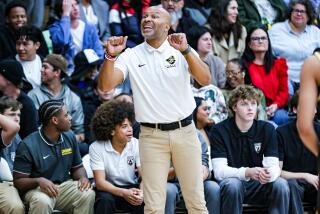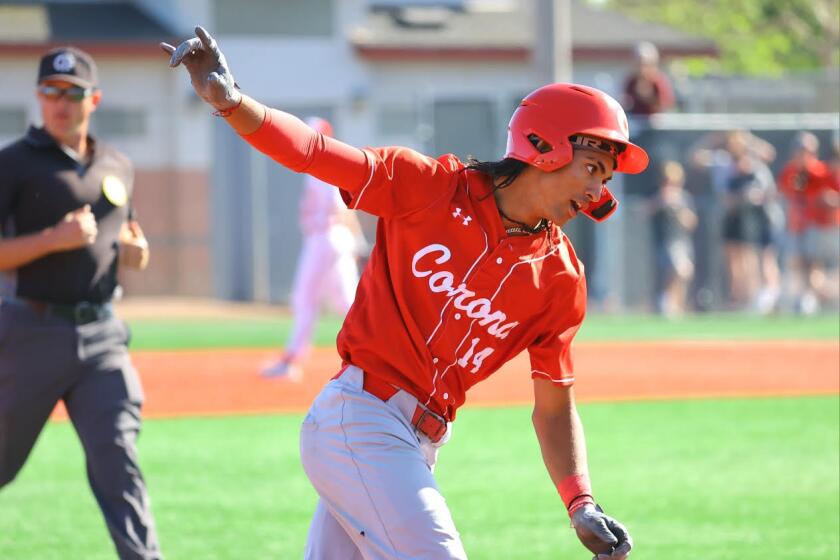For Some, Attention Is Too Hot to Handle : Coverage: Young athletes, eager to be cooperative and advance their careers, reveal items of a personal nature they later regret.
- Share via
Eddie Powell thought it would be fun.
Powell, a standout basketball and football player at Verdugo Hills High, had just finished being interviewed for a newspaper personality profile. He had seen stories on other athletes that “talked about a lot of good stuff,” as he put it, and figured this would be the same. Powell, 18, liked the idea of people reading “fun things” about him and his accomplishments.
Powell, who seldom had been more excited, waited eagerly for the “big-time story” to appear. Exuberance turned to dismay, however, after he read the story.
The reporter covered aspects of Powell’s personal life--including a tumultuous relationship with his parents--he did not expect to see in the newspaper. He was further hurt by insensitive comments by classmates who read the article.
Although Powell does not dispute the accuracy of what was written, he believes the reporter should have included only “the good stuff” about his life.
“I didn’t like the way (the story) was put together,” Powell said. “That other stuff isn’t anybody else’s business.
“Yeah, I wanted the story, but I didn’t want that stuff in there. If I knew (the reporter) was going to have that stuff in there, I never would have said anything--nothing.”
High school athletes crave media attention--and not just for ego gratification. Many believe they need exposure to advance their careers to the next level. However, young athletes are unskilled and often unprepared to deal with the media coverage, which can make the spotlight too bright to bear.
Tobaise Brookins, 18, a freshman tailback at Washington, was a junior at Sylmar High when he was featured in a high school athlete-of-the-week story. Brookins had no experience dealing with the media to that point and was eager to see his name in print. He enjoyed being interviewed and hoped to be again.
Then the story appeared.
It revealed sensitive, traumatic situations in Brookins’ personal life. The article created a rift between Brookins and his mother and drove the gifted athlete to tears.
“That wasn’t something I really wanted out. . . . I didn’t want that in the paper,” Brookins said in a telephone interview from Seattle. “It hurt me and my family, but I don’t blame (the reporter) because she just wrote what she heard.
“I should have just said I didn’t want to talk about those things, but I wasn’t used to dealing with (the media). I didn’t articulate myself the way I should have.
“After what happened, (Sylmar Coach Jeff) Engilman told me that you have to be precise when you’re doing an interview. You have to pick your words carefully because reporters are taught to develop stories. If you say something they think will make a good angle for the story they will use it.
“I didn’t do that because I wasn’t used to dealing with the press, and I was also on such a high because I was the athlete of the week. But you still have to think about what you say.”
Said Engilman: “High school sports have evolved and become so much bigger than they used to be. It used to be that (only) coaches were asked questions. Now reporters do interviews with the kids. They’re not used to that.”
Athletes at the high school level are not counseled on dealing with the media to the degree that those in the college and pro ranks are.
While some coaches in team meetings briefly address the subject of how to respond to journalists’ questions, high schools do not have the staff or resources to educate athletes about what they can expect--and what will be expected of them--by the media.
But most journalists covering high school sports are sensitive to young athletes and deal with them appropriately, according to Lon Eubanks, The Times’ Valley Edition sports editor.
“We can appreciate the awkward position some young athletes are put into,” Eubanks said. “Many are naive about dealing with the media, but I feel most reporters covering high school sports try to keep all that in mind. I don’t feel, as a rule, they try to take advantage of that just to sensationalize or enliven a story.”
Eubanks said, however, that young athletes must take some responsibility for what they say.
“Sometimes young athletes might be more sensitive about some things than what we would expect them to be and sometimes things come out that they wish hadn’t,” he said. “The fact is that press coverage can have both positive and negative aspects to those involved at any time.
“But all athletes have to be aware that the press isn’t just a public relations arm for them, their coach or their team. There are more mature college and pro athletes who still don’t quite fully understand that.”
Many young athletes lack understanding of how the media operate, according to Brookins.
“Reporters come to you almost as friends would to have a conversation,” Brookins said. “When you’re interviewed for the first time, you forget that you’re talking to someone who is doing a job.
“Their job is to find out things about you that you probably don’t want everyone to know. You don’t get it at first--but you better learn.”
Powell, the Verdugo Hills player, was disturbed by the content of the story written about him because he did not think the writer would include family topics they discussed. He felt betrayed.
“It was a little bit unfair,” Powell said. “I mean, here (the reporter) comes to me tellin’ me she wants to write a nice story about me, then she puts all that negative stuff in there.
“I wasn’t ready for all of that.”
Often, high school athletes learn about media on the job--in lengthy interviews for profile stories or moments after an event.
Davis Delmatoff is among them.
The record-setting quarterback of Hart was one of the most interviewed players in the area last season.
Delmatoff, 17, was thrust into the media eye as a junior receiver when he caught the winning touchdown in the Indians’ opening-game victory over Santa Clarita Valley archrival Canyon during the 1991 season. Catching the pass was easier than what followed.
“You try to be real careful talking to reporters after games . . . you don’t want to say anything dumb or act cocky,” he said. “You try to act like you’ve (been interviewed) before, even though you know you haven’t.
“You really don’t know exactly what you should say the first time you get interviewed.”
Many neophyte interview subjects are intimidated by questions but answer them nonetheless.
High school athletes often offer truthful responses in fear of being perceived as rude or difficult to work with.
They believe bad reputations can adversely affect their chances of receiving college scholarship offers.
“Young athletes need to know they can say ‘no’ to questions, but they really don’t think they can,” Brookins said. “The fear is that you won’t get any ‘pub’ if you’re not nice to these people.
“Newspaper reporters have a lot to say about your status in terms of you getting recruited by colleges.”
The importance of the right kind of media coverage was underscored for Brookins recently. Coaches at Washington have told him about several athletes the school stopped pursuing recently because of newspaper stories about their conduct.
“There’s a lot more involved with getting a scholarship; it’s not necessarily just how good you are,” Brookins said.
“Schools don’t want people who are getting bad press--they don’t want jerks.”
Tarik Smith worried about gaining that label last fall. The Oak Park running back was regarded as one of the top recruits in the Southland entering his senior season after he had rushed for almost 1,800 yards and scored 22 touchdowns as a junior.
But Smith endured a tumultuous senior season. He was suspended from the team twice--once for skipping a class and again for an alcohol-related offense.
Smith feared college recruiters would lose interest in him upon learning of the incidents.
“I thought they would think I would be a big problem; that I was a bad guy or something,” Smith said. I knew what I did was wrong, but it wasn’t like I robbed anyone or anything like that.”
Smith decided to act quickly.
“I was really worried about that, so I called all of the (Pacific 10 Conference schools) and told them about what happened before they found out on their own,” he said. “They all appreciated me doing that.”
He committed to California last week.
Thousand Oaks football Coach Bob Richards agrees the media do have an impact on recruiting. To what degree he is unsure.
“(College coaching staffs) subscribe to various papers all over the country to read about kids,” he said. “That definitely helps someone get noticed.”
There are times, though, when high school athletes would rather not receive attention. Unfortunately for Delmatoff, he experienced one of those moments during the final game of his high school football career.
Delmatoff was dazzling throughout the regular season. He piled up yardage and touchdown passes while leading Hart to an undefeated regular season.
With Delmatoff playing well, Hart won its opening-round Southern Section Division II playoff game easily. But in the quarterfinals, Delmatoff threw three interceptions and fumbled twice as the Indians were upset by Crescenta Valley, 13-7.
“You try not to put every good article about you on a pedestal and you try not to let every bad article eat you up inside, but it does hurt,” Delmatoff said. “I think the exposure we get is great, but (high school athletes) get too much glory when we win and too much blame when we lose.”
More to Read
Get our high school sports newsletter
Prep Rally is devoted to the SoCal high school sports experience, bringing you scores, stories and a behind-the-scenes look at what makes prep sports so popular.
You may occasionally receive promotional content from the Los Angeles Times.






